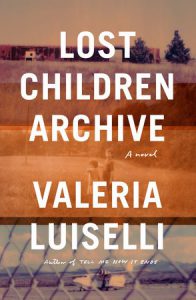A novel has emerged from the humanitarian crisis at the border. Not only is it an indictment of U.S. immigration policy, but a requiem memorializing every child who has ever lost their right to a childhood. Here is a snippet of the review I recently wrote for The Texas Observer:
Early in Valeria Luiselli’s virtuosic new novel, Lost Children Archive, the narrator realizes she has entered an ethical minefield. She makes radio documentaries for a living, and while she knows in her bones that testimonios must be recorded of the thousands of unaccompanied kids fleeing the calamities of their homelands, she worries about the implications of the endeavor.
“How can an artwork be useful in helping more undocumented children find asylum?” she asks herself. “Isn’t art for art’s sake so often an absolutely ridiculous display of intellectual arrogance? … And why would I even think that I can or should make art with someone else’s suffering? … No one decides to not go to work and start a hunger strike after listening to the radio in the morning.”
Readers of Luiselli’s four previous books will detect her own ethos in this lament. In 2017, she published the slender but devastating Tell Me How It Ends: An Essay in Forty Questions, which chronicled her work as a translator for child migrants caught up in the U.S. court system. It won rave reviews and an American Book Award, but Luiselli strikes me as the kind of writer who’d prefer a hunger strike. Lost Children Archive, then, can almost be read as the Mexico City-born intellectual’s second attempt to rally the citizenry of her adopted country — this time, with a 400-page novel that auto-fictionalizes a cross-country road trip she took with her family a few years ago.
I admit to my own skepticism during the first half of Lost Children Archive….
To read more, visit the site.

